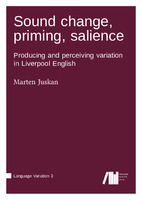Sound change, priming, salience
Producing and perceiving variation in Liverpool English
Author(s)
Juskan, Marten
Collection
Knowledge Unlatched (KU)Number
103660Language
EnglishAbstract
This volume investigates the realisation and perception of four phonological variables in Liverpool English (Scouse), with a special focus on their sociolinguistic salience. Younger speakers’ speech is found to be more local, but only for the two salient variables in the sample (NURSE-SQUARE and /k/ lenition), which appear to carry considerable amounts of covert prestige. Local variants of non-salient happy-tensing and velar nasal plus, on the other hand, are actually found to be receding, so at least to a certain extent Scouse also seems to be participating in regional dialect levelling. The importance of salience is also obvious in the perception data, with only the two highly salient stereotypes generating robust effects in a social priming experiment (albeit in the unexpected direction). These results indicate that the investigated variables differ measurably not only in their use in production, but also in terms of how central they are to mental sociolinguistic representations of Scouse. They also tell us more about the way we process, store, and (re-)use sociolinguistic variation in perception. By defining likely contexts for significant priming effects they might finally even help in coming up with a more elaborate “theory of priming” in the realm of sociophonetics.
Keywords
LinguisticsDOI
10.5281/zenodo.1451308ISBN
9783961101191OCN
1083006121Publisher
Language Science PressPublisher website
https://langsci-press.org/Publication date and place
Berlin, 2018-11-12Series
Language Variation,Classification
Linguistics


 Download
Download